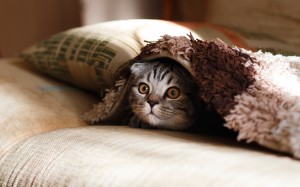Earlier this month, we outlined a few ways in which your cat might demonstrate anxiety, stress or discomfort. Since then, the team have put together some simple ways to reduce your cat’s anxiety. Below are Karingal Veterinary Hospital’s six tips on how to destress a cat.
Just as teens retreat to their bedrooms, and adults to their homes, cats need a place they know is theirs, where they are safe, calm and away from the daily feline grind.
 Set aside a corner in your home and place a few of your cat’s favourite toys, blankets and some climbing equipment. Make sure this area is away from anything too loud for the cat, such as the TV, stereo, fridge or washing machine. Remember, nobody likes to feel trapped, especially cats, so make sure they can access this area whenever they need to.
Set aside a corner in your home and place a few of your cat’s favourite toys, blankets and some climbing equipment. Make sure this area is away from anything too loud for the cat, such as the TV, stereo, fridge or washing machine. Remember, nobody likes to feel trapped, especially cats, so make sure they can access this area whenever they need to.
Keep your cat’s food, water and litter tray somewhere quiet and out of the way. Although not a big deal for humans, fridges, dryers and washing machines make a lot of noise and can be off-putting for cats when they are trying to eat. Similarly, cats can find it difficult to relax when their litter tray is kept in a major thoroughfare such as a hallway or kitchen. Having to pass or step over your cat can startle it during its more private moments, resulting in a more stressed or anxious feline.
Vertical spaces both indoors and out provide cats with the opportunity to exhibit their natural behaviours. Scratching posts or climbable furniture are great ways to distract your cat, and may give them a little exercise too. Toys and games let your cat burn some nervous energy, and help strengthen the bond between the two of you. Toys that they can play with on their own, scratching and climbing posts and other cat accessories help keep your cat entertained, lowering their stress levels and improving their quality of life.
Toys, games and climbing equipment let your cat do what it has evolved to do. Climbing and exploring are big parts of your cat’s nature. Let them embrace this side of themselves by creating vertical spaces for them to climb, and by encouraging their scouting behaviour — for example, hide some food around the house for them to sniff out.
As perceptive as they may seem, don’t assume your cat understands what you are saying, or shout at them when they don’t understand you. Punishing your cat will only teach them to fear you and will not correct the unwanted behaviour. Instead, demonstrate and reward positive behaviours around your cat.
Equally, be careful when petting not to bear down on your cat or grab their head. Cats like to know they can escape a situation. Restricting their movements by holding them too tightly or by trapping them in a corner only stresses them out.
Cats are clever creatures and appreciate new stimuli. Put your cat on a lead or bungee harness and let them explore the outside with you. New sights and smells stimulate your cat’s brain and may help long-term development as well as day-to-day stress levels.
Feliway is a pheromone spray designed to create comfortable environments for stressed or anxious cats. When introducing a cat to a new environment, it is a good idea to use Feliway to make them feel safe. Use Feliway in your cat’s chill-out zone, or buy a diffuser for your home.
If you are worried about your cat’s anxiety, talk to one of our staff today. At Karingal Veterinary Hospital and Ballam Park Vet Clinic, our vets understand feline behaviour and are able to offer a number of potential solutions for your cat’s anxiety. Additionally, we offer a range of behaviour treatments, such as pet acupuncture and laser therapy. These are safe, alternative approaches to anxiety with proven results.
While you are here, why not read some of our other cat care posts? We’ve written on cat weight management, pet dentistry and common cat issues, and more. Remember, for all your cat care in Mornington Peninsula, including Frankston, Langwarrin, Seaford and Somerville, contact Karingal Veterinary Hospital today.